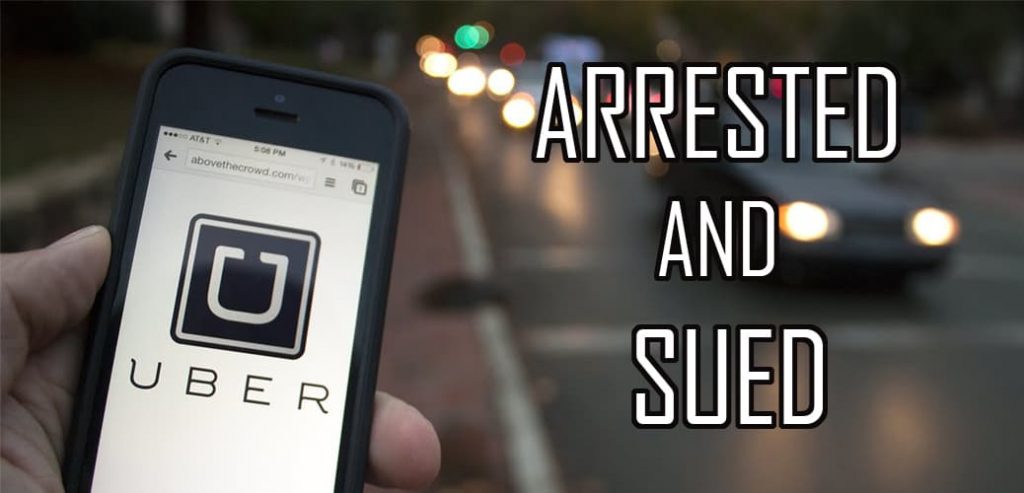You offer a great product or service. At least you believe so. Now you want to protect yourself and your company from a frivolous or nuisance lawsuit. The easiest way to do this is mandate an arbitration clause into all agreements with those who do business with you.
An arbitration clause will help limit the number of lawsuits and help you deal with them on a local level as opposed to being dragged into court by plaintiffs all over the country. They have been used effectively for decades and will save you both time and money. However, not all jurisdictions honor them as some – including California – see them as unconscionable and therefore unenforceable.
Unconscionability is a doctrine in contract law that states the terms of the contract are unjust as one side has superior bargaining power or the “upper hand” in the deal. Basically, one side has the power over the other and the person with less power is “forced” to enter into the agreement with unjust terms.
Here is the example of unconscionability that got me through law school:
Image your car broke down in the middle of the desert with no one around. You walk for 10 hours and come to a service station. There is no other service station for 10 hours and no one else to help you. You ask to use the telephone and the attendant agrees……..for $100. This is an agreement that you are forced into entering as you need the help. However, the terms are unconscionable as even your monthly cell phone plan doesn’t run you $100.
Many arbitration clauses are implemented in order to save companies money. There are consumers out there who will file “nuisance” lawsuits that would cost you more to litigate than it would be to settle out of court. Many companies settle these and pay the consumer regardless of liability as it is a “nuisance” to go to court and fight it. However, some companies take advantage of arbitration agreements in order to force consumers’ hands when it comes to enforcing their rights.
Most agreements with unconscionable terms are unenforceable. However, deciding if a term meets the definition of unconscionable is another matter. While the end result of unconscionability is a contract being unenforceable, getting the courts to agree a term is such is an uphill battle. This is something the courts have dealt with quite a bit recently and could affect the way you do business with your customers in the future.
California consumers and DirecTV:
In 2015, the United States Supreme Court heard the arguments in a class action suit brought against DirecTV by consumers in California.
The case began in 2008 with a consumer in California filing a class action on behalf of herself and plaintiffs against DirecTV claiming that she was wrongly charged an early termination fee. Attorneys for DirecTV argued that they could not be sued as Plaintiffs agreed to handle disputes through arbitration, a clause contained in the original agreement when they signed up for service.
The unconscionability argument comes into play with this case. A district judge in Los Angeles ruled that forcing consumers into arbitration clauses in unconscionable and could not be enforced. Basically, you must agree to arbitration or you cannot obtain the service. Since they are one of limited people offering such service – and in some places the only one – the contact terms are considered “forced” or unconscionable.
DirecTV disagreed and appealed the matter all the way to the U.S. Supreme Court. The ultimate ruling supported DirecTV – cited as DirecTV vs. Imburgia – as there was already a 2011 ruling of similar nature stating that California law does not trump Federal law. The Federal Arbitration Act was cited by the Court as the Federal law that is being enforced with such agreements.
While this ruling may seem like a victory for companies, don’t bet the farm on it just yet. Legislation of a somewhat similar nature has been born which could help negate this ruling.
Anti-review clause legislation coming:
In November 2015 I wrote about new legislation that will effectively put an end to terms and conditions that restrict consumers from leaving negative reviews for products or services. Many businesses are using these terms to limit the number of negative reviews that may appear about them online.
While this is a good way to get people to give companies an opportunity to cure any type of breach, it has also been seen as a way of silencing consumers.
Granted, this review legislation is in a different category than arbitration, but it has the same process of trying to limit what consumers can and cannot do when it comes to agreements. Despite the Supreme Court ruling above, we could see legislation sparked which addresses such arbitration rulings, making them unconscionable.
You can see how legislation is coming about to protect consumers. Anti-review clauses are being address at the present and arbitration clauses are likely next.
And then there was Uber:
I am not sure how Uber seems to find its way into just about every legal discussion, but here we go again. In December 2015 the company received a ruling that hindered them from implementing an arbitration agreement on drivers, something the court ruled was unconscionable. This is part of the ongoing class action lawsuit from driver’s seeking to be classified as employees as opposed to independent contractors.
For those not familiar with the Uber-model, here is a quick overview:
Uber allows people with vehicles to sing up on the ride-sharing app as a driver. Uber then connects them with people needing rides. Once the transaction is completed between the drivers and passengers, Uber takes a cut of the fare as a fee for connecting the two. While Uber sees this a simply connecting consumers with service providers, some drivers are arguing differently.
While the lawsuit was underway (still going as of January 2016), Uber sent out new driver agreements. The new agreement required drivers to settle disputes with the company via arbitration as opposed to lawsuits. The agreement was sent out just two days after the court extended the “class” of the lawsuit to more drivers.
The court saw this is as Uber trying to manipulate the current lawsuit. The judge ruled that the provisions of the new agreement were “unlawful, unconscionable, and unenforceable.” The judge also required Uber to consult with the court prior to issuing any other type of contract language to its drivers.
The argument in the matter was that Uber was forcing drivers into submission of arbitration, even though they currently did not have to. This type of tactic is seen as a “sign or else” type of agreement and as such was found unconscionable as many drivers would essentially enter into the agreement in order to continue their livelihood.
While the class action is in the process of making its way through the courts, drivers should not have to worry about any unconscionable terms being forced on them.
Uphill battle for plaintiffs:
As stated earlier, unconscionability will lead to a contract being unenforceable. If not in its entirety, at least the term within that is considered so. However, the uphill battle comes for plaintiffs as they need to prove the elements and get a court to agree.
A plaintiff must show that you had the upper hand on them and that they had no other choice but to enter into the agreement – not quite like having a gun to their head, but that is a good example. If you take the DirecTV example above, one could argue that since there are other service providers that offer the same or similar services, the agreement was not “forced.” While not always affective, it is still a defense that can be used and cause the plaintiff to work hard to prove otherwise.
While arbitration clauses are sometimes found unenforceable, some still are. The U.S. Supreme Court agrees that arbitration rights of companies should be protected but individual states such as California have disagreed and have actively fought against them. For now, the U.S. Supreme Court has sent a message that the Federal Arbitration Act is the ruling law and states must conform to such.





![Why The Government Is Trying To Shutdown The Uber For Flights [e227]](https://www.pashalaw.com/wp-content/uploads/2015/10/iStock_000053051100_Small.jpg)


![The Decision That Could Change The Way Uber Does Business [e199] The Decision That Could Change The Way Uber Does Business](https://www.pashalaw.com/wp-content/uploads/2015/06/The-Decision-That-Could-Change-The-Way-Uber-Does-Business.jpg)
![Why California Employers Should Avoid Re-Hire Clauses [e184] Why California Employers Should Avoid Re-Hire Clauses](https://www.pashalaw.com/wp-content/uploads/2015/05/Why-California-Employers-Should-Avoid-Re-Hire-Clauses-.jpg)
![How To Work as a Freelancer While Also Being an Employee [e150] How To Work as a Freelancer While Also Being an Employee](https://www.pashalaw.com/wp-content/uploads/2015/02/How-To-Work-as-a-Freelancer-While-Also-Being-an-Employee-.jpg)




![Law in the Digital Age: Exploring the Legal Intricacies of Artificial Intelligence [e323]](https://www.pashalaw.com/wp-content/uploads/2023/11/WhatsApp-Image-2023-11-21-at-13.24.49_4a326c9e-300x212.jpg)
![Unraveling the Workforce: Navigating the Aftermath of Mass Layoffs [e322]](https://www.pashalaw.com/wp-content/uploads/2023/07/Untitled-design-23-300x212.png)
![Return to the Office vs. Remote: What Can Employers Legally Enforce? [e321]](https://www.pashalaw.com/wp-content/uploads/2023/01/Pasha_LSSB_321_banner-300x212.jpg)
![Explaining the Hans Niemann Chess Lawsuit v. Magnus Carlsen [e320]](https://www.pashalaw.com/wp-content/uploads/2022/10/LAWYER-EXPLAINS-7-300x169.png)
![California v. Texas: Which is Better for Business? [313]](https://www.pashalaw.com/wp-content/uploads/2021/07/Pasha_LSSB_CaliforniaVSTexas-300x212.jpg)
![Buyers vs. Sellers: Negotiating Mergers & Acquisitions [e319]](https://www.pashalaw.com/wp-content/uploads/2022/06/Pasha_LSSB_BuyersVsSellers_banner-300x212.jpg)
![Employers vs. Employees: When Are Employment Restrictions Fair? [e318]](https://www.pashalaw.com/wp-content/uploads/2022/05/Pasha_LSSB_EmployeesVsEmployers_banner-1-300x212.jpg)
![Vaccine Mandates Supreme Court Rulings [E317]](https://www.pashalaw.com/wp-content/uploads/2022/02/WhatsApp-Image-2022-02-11-at-4.10.32-PM-300x212.jpeg)
![Business of Healthcare [e316]](https://www.pashalaw.com/wp-content/uploads/2021/11/Pasha_LSSB_BusinessofHealthcare_banner-300x212.jpg)
![Social Media and the Law [e315]](https://www.pashalaw.com/wp-content/uploads/2021/10/WhatsApp-Image-2021-10-06-at-1.43.08-PM-300x212.jpeg)
![Defining NDA Boundaries: When does it go too far? [e314]](https://www.pashalaw.com/wp-content/uploads/2021/09/Pasha_LSSB_NDA_WordPress-2-300x212.jpg)
![More Than a Mistake: Business Blunders to Avoid [312] Top Five Business Blunders](https://www.pashalaw.com/wp-content/uploads/2021/06/Pasha_LSSB_Blunders_WP-1-300x212.jpg)
![Is There a Right Way to Fire an Employee? We Ask the Experts [311]](https://www.pashalaw.com/wp-content/uploads/2021/02/Pasha_LSSB_FireAnEmployee_Website-300x200.jpg)
![The New Frontier: Navigating Business Law During a Pandemic [310]](https://www.pashalaw.com/wp-content/uploads/2020/12/Pasha_LSSB_Epidsode308_Covid_Web-1-300x200.jpg)
![Wrap Up | Behind the Buy [8/8] [309]](https://www.pashalaw.com/wp-content/uploads/2020/11/Pasha_BehindTheBuy_Episode8-300x200.jpg)
![Is it all over? | Behind the Buy [7/8] [308]](https://www.pashalaw.com/wp-content/uploads/2020/09/iStock-1153248856-overlay-scaled-300x200.jpg)
![Fight for Your [Trademark] Rights | Behind the Buy [6/8] [307]](https://www.pashalaw.com/wp-content/uploads/2020/07/Fight-for-your-trademark-right-300x200.jpg)
![They Let It Slip | Behind the Buy [5/8] [306]](https://www.pashalaw.com/wp-content/uploads/2020/06/Behind-the-buy-they-let-it-slip-300x200.jpg)
![Mo’ Investigation Mo’ Problems | Behind the Buy [4/8] [305]](https://www.pashalaw.com/wp-content/uploads/2020/05/interrobang-1-scaled-300x200.jpg)
![Broker or Joker | Behind the Buy [3/8] [304] Behind the buy - Broker or Joker](https://www.pashalaw.com/wp-content/uploads/2020/04/Joker-or-Broker-1-300x185.jpg)
![Intentions Are Nothing Without a Signature | Behind the Buy [2/8] [303]](https://www.pashalaw.com/wp-content/uploads/2020/04/intentions-are-nothing-without-a-signature-300x185.jpg)
![From First Steps to Final Signatures | Behind the Buy [1/8] [302]](https://www.pashalaw.com/wp-content/uploads/2020/04/first-steps-to-final-signatures-300x185.jpg)
![The Dark-side of GrubHub’s (and others’) Relationship with Restaurants [e301]](https://www.pashalaw.com/wp-content/uploads/2015/04/When-Competition-Goes-Too-Far-Ice-Cream-Truck-Edition-300x201.jpg)
![Ultimate Legal Breakdown of Internet Law & the Subscription Business Model [e300]](https://www.pashalaw.com/wp-content/uploads/2019/05/Ultimate-Legal-Breakdown-of-Internet-Law-the-Subscription-Business-Model-300x196.jpg)
![Why the Business Buying Process is Like a Wedding?: A Legal Guide [e299]](https://www.pashalaw.com/wp-content/uploads/2019/03/futura-300x169.jpg)
![Will Crowdfunding and General Solicitation Change How Companies Raise Capital? [e298]](https://www.pashalaw.com/wp-content/uploads/2018/11/Will-Crowdfunding-and-General-Solicitation-Change-How-Companies-Raise-Capital-300x159.jpg)
![Pirates, Pilots, and Passwords: Flight Sim Labs Navigates Legal Issues (w/ Marc Hoag as Guest) [e297]](https://www.pashalaw.com/wp-content/uploads/2018/07/flight-sim-labs-300x159.jpg)
![Facebook, Zuckerberg, and the Data Privacy Dilemma [e296] User data, data breach photo by Pete Souza)](https://www.pashalaw.com/wp-content/uploads/2018/04/data-300x159.jpg)
![What To Do When Your Business Is Raided By ICE [e295] I.C.E Raids business](https://www.pashalaw.com/wp-content/uploads/2018/02/ice-cover-300x159.jpg)
![General Contractors & Subcontractors in California – What you need to know [e294]](https://www.pashalaw.com/wp-content/uploads/2018/01/iStock-666960952-300x200.jpg)
![Mattress Giants v. Sleepoplis: The War On Getting You To Bed [e293]](https://www.pashalaw.com/wp-content/uploads/2017/12/sleepopolis-300x159.jpg)
![The Harassment Watershed [e292]](https://www.pashalaw.com/wp-content/uploads/2017/12/me-2-300x219.jpg)
![Investing and Immigrating to the United States: The EB-5 Green Card [e291]](https://www.pashalaw.com/wp-content/uploads/2012/12/eb-5-investment-visa-program-300x159.jpg)
![Responding to a Government Requests (Inquiries, Warrants, etc.) [e290] How to respond to government requests, inquiries, warrants and investigation](https://www.pashalaw.com/wp-content/uploads/2017/10/iStock_57303576_LARGE-300x200.jpg)
![Ultimate Legal Breakdown: Employee Dress Codes [e289]](https://www.pashalaw.com/wp-content/uploads/2017/08/Ultimate-Legal-Breakdown-Template-1-300x159.jpg)
![Ultimate Legal Breakdown: Negative Online Reviews [e288]](https://www.pashalaw.com/wp-content/uploads/2017/06/Ultimate-Legal-Breakdown-Online-Reviews-1-300x159.jpg)
![Ultimate Legal Breakdown: Social Media Marketing [e287]](https://www.pashalaw.com/wp-content/uploads/2017/06/ultimate-legal-breakdown-social-media-marketing-blur-300x159.jpg)
![Ultimate Legal Breakdown: Subscription Box Businesses [e286]](https://www.pashalaw.com/wp-content/uploads/2017/03/ultimate-legal-breakdown-subscription-box-services-pasha-law-2-300x159.jpg)
![Can Companies Protect Against Foreseeable Misuse of Apps [e285]](https://www.pashalaw.com/wp-content/uploads/2017/01/iStock-505291242-300x176.jpg)
![When Using Celebrity Deaths for Brand Promotion Crosses the Line [e284]](https://www.pashalaw.com/wp-content/uploads/2017/01/celbrity-300x159.png)
![Are Employers Liable When Employees Are Accused of Racism? [e283] Racist Employee](https://www.pashalaw.com/wp-content/uploads/2016/12/Are-employers-liable-when-an-employees-are-accused-of-racism-300x159.jpg)
![How Businesses Should Handle Unpaid Bills from Clients [e282] What to do when a client won't pay.](https://www.pashalaw.com/wp-content/uploads/2016/12/How-Businesses-Should-Handle-Unpaid-Bills-to-Clients-300x159.png)
![Can Employers Implement English Only Policies Without Discriminating? [e281]](https://www.pashalaw.com/wp-content/uploads/2016/11/Can-Employers-Impliment-English-Only-Policies-Without-Discriminating-300x159.jpg)
![Why You May No Longer See Actors’ Ages on Their IMDB Page [e280]](https://www.pashalaw.com/wp-content/uploads/2016/10/IMDB-AGE2-300x159.jpg)
![Airbnb’s Discrimination Problem and How Businesses Can Relate [e279]](https://www.pashalaw.com/wp-content/uploads/2016/09/airbnb-300x159.jpg)
![What To Do When Your Amazon Account Gets Suspended [e278]](https://www.pashalaw.com/wp-content/uploads/2016/09/What-To-Do-When-Your-Amazon-Account-Gets-Suspended-1-300x200.jpg)
![How Independent Artists Reacted to Fashion Mogul Zara’s Alleged Infringement [e277]](https://www.pashalaw.com/wp-content/uploads/2016/08/How-Independent-Artists-Reacted-to-Fashion-Mogul-Zaras-Alleged-Infringement--300x159.jpg)
![Can Brave’s Ad Replacing Software Defeat Newspapers and Copyright Law? [e276]](https://www.pashalaw.com/wp-content/uploads/2016/08/Can-Braves-Ad-Replacing-Software-Defeat-Newspapers-and-Copyright-Law-300x159.jpg)
![Why The Roger Ailes Sexual Harassment Lawsuit Is Far From Normal [e275]](https://www.pashalaw.com/wp-content/uploads/2016/07/WHY-THE-ROGER-AILES-SEXUAL-HARASSMENT-LAWSUIT-IS-FAR-FROM-NORMAL-300x159.jpeg)
![How Starbucks Turned Coveted Employer to Employee Complaints [e274]](https://www.pashalaw.com/wp-content/uploads/2016/07/iStock_54169990_LARGE-300x210.jpg)
